For the last couple of months, Kosovo and Serbia have been sparring over a new law requiring ethnic Serbs in Northern Kosovo to use Kosovan license plates. Tensions flared in August when the new law was supposed to come into force, but the Kosovo authorities eventually backed down and agreed to delay its implementation. It looked like things would calm down when the EU brokered an uneasy deal at the end of November that banned Kosovo from issuing fines to people who refused to swap the plates and banned Serbia from issuing registrations with the initials of towns in Kosovo, but in the last week or so, tensions have flared up once again.

Tensions between Serbia and Kosovo have been high since Kosovo declared independence in 2008, and Serbia does not recognize Kosovo as an independent state. The two countries were part of Yugoslavia until the 1990s, when an economic slowdown and the rise of Serbian nationalists led by Slobodan Miloevi triggered its breakup. During the Kosovo War in the late 1990s, NATO intervened decisively in favor of Kosovan separatists despite never receiving authorization from the UN, and Miloevi eventually agreed to withdraw all federal forces from Kosovo. Since then, NATO has maintained a peacekeeping force in the region, commonly known as KFOR, which today consists of about 3,500 NATO troops. The war ended with Kosovo being placed under UN supervision, and in February 2008, Kosovo declared independence, with 109 out of the 120 members of the Assembly of Kosovo voting to secede from Serbia.
The Declaration of Independence of Kosovo was deemed illegal under the Serbian Constitution, but it was approved by the International Court of Justice and subsequently recognized by a majority of European Union countries and the United States. This decision was not well received by either Serbia, which does not recognize Kosovo's independence, or the ethnic Serbs living in Kosovo, who represent about 8% of the population and mostly live in northern Kosovo near the Serbian border. Ethnic Serbs have regularly protested against efforts by Kosovan authorities to assert their jurisdiction in the region, and were unhappy when Kosovan authorities first tried to ban Serbian license plates in September last year. According to the BBC, around 50,000 ethnic Serbs living in the region use license plates issued by Serbian authorities and refuse to recognize Kosovan institutions. The Kosovan Authority temporarily backed down, but tried again in July, prompting another angry reaction from ethnic Serbs.

The authorities in Kosovo backed down but said they would try again in 30 days, which did not go over well with the ethnic Serbs. Anticipating another conflict, the EU began negotiating a deal between the two sides, which was eventually agreed upon in late November. According to Yosef Boral, Serbia agreed to stop issuing license plates with Kosovo city denominations, and Kosovo agreed to stop trying to implement the license plate law. However, seasoned Balkan watchers were skeptical that this would be the end of the issue, as the EU does not have a great track record in the region and there have been many agreements in the past that have not conclusively resolved the issue. Additionally, the deal only addressed the issue of fines for license plates and not all of the accompanying issues, such as the ongoing blockades set up by ethnic Serbs in protest around Northern Kosovo and the perceived intimidation of ethnic Serbs by Kosovo police. The Kosovo government claims that more police are needed in Northern Kosovo to quell the unrest and that they do not have any ethnically Serbian police anymore because most of the ethnic Serbs in the Kosovo police force quit in protest at the license plate law in early November.
Ethnic Serb police in Kosovo were originally replaced by the EU's mission, EULex, but they failed to stem the unrest, and ethnically Albanian Kosovo police got involved. According to Kosovo's Constitution and the Brussels Agreement, the police force in Northern Kosovo is supposed to be majority Serb to reflect the ethnic constitution of the region. Tensions escalated over the weekend after the Kosovo authorities sent some 200 ethnically Albanian Kosovo police into the region accompanied by armored vehicles, who promptly arrested an ethnically Serbian former police officer on suspicion of terrorism. On Saturday, there were multiple shootouts between Kosovo police and ethnic Serbs, and in Serbia, there were marches in support of ethnic Serbs in Kosovo, with protesters waving Serbian and Russian flags and chanting "Serbia is Kosovo" and "F*ck NATO."
The following day, ethnic Subs set up barricades on the roads connecting Northern Kosovo to the rest of Kosovo in response to the new bout of unrest. Serbia's President Alexander Verucic announced that Serbia would request to send Serbian military and police into Kosovo, claiming that his actions were sanctioned by U.N. Security Council resolution 1244. UNSC-1244 was passed in June 1999 in the aftermath of the Kosovo war, and it states that an "agreed number of Serb military and police personnel are permitted to return to Kosovo to perform the functions in accordance with Annex II." At the time of this writing, Verucic has yet to actually send his request to the KFOR. He said he'll formally apply for sending troops on Thursday, but he'll probably argue that Serbian troops are required to guarantee ethnic Serbs a safe environment as provided for in Annex II. So what happens next?

Despite the slim chance that KFOR will agree to Richard's request, tensions between Kosovo and Serbia remain high, which is a cause for concern. Relations between the two sides have been improving due to the EU facilitating dialogue for over a decade, but recent events such as Putin's invasion of Ukraine and the resulting resurgence of anti-NATO sentiment in Serbia have led to a deterioration in relations. Anti-NATO and anti-Kosovo protests are ongoing in Serbia, and Serbian nationalist Ruchic is under political pressure to escalate the situation. Kosovo's recent decision to apply for EU membership after previously applying to join NATO puts pressure on the West to choose between Kosovo and Serbia, as Serbia has been in negotiations to join the EU since 2009 and was expected to join in the mid-2020s. While an immediate conflict may not be imminent, the current situation is deteriorating, which is a cause for concern.
The Z in the face is really very fitting....
But Selenzky needs one too.
Dear @scientify,
Your support for the current HiveBuzz proposal (#199) is much appreciated but it will expire end of December!
May we ask you to review the new proposal (#248) and renew your support so that our team can continue their work next years?
You can support the new proposal on Peakd, Ecency,
https://peakd.com/proposals/248
We wish you a Happy New Year!